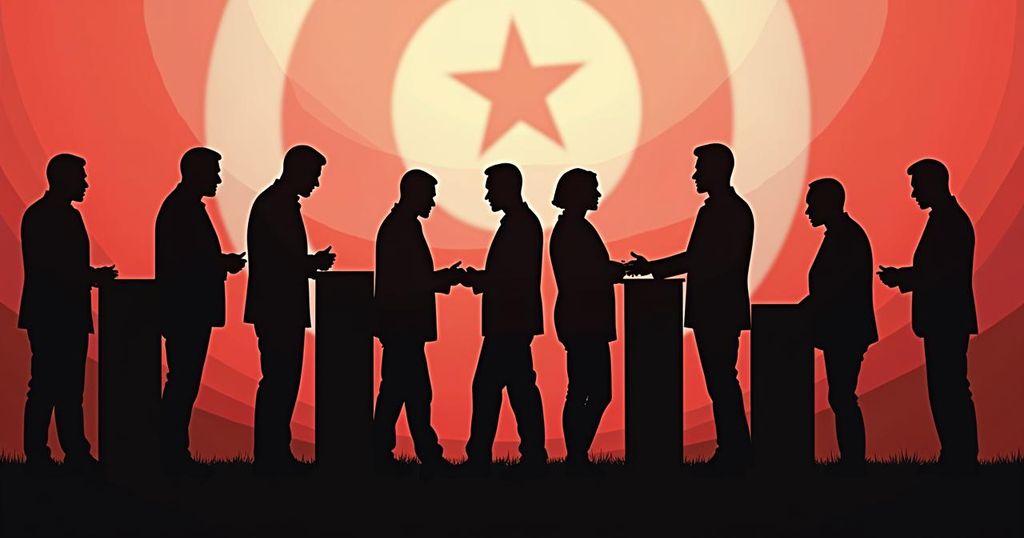Tunisians are voting in a presidential election with President Kais Saied as the clear favorite against minimal opposition. Most significant challengers are currently imprisoned or barred from participation, casting doubt on the election’s legitimacy. This election, the first since Saied’s controversial power consolidation in July 2021, reflects ongoing challenges within Tunisia’s democracy and economy, amid growing public discontent and calls for boycotts from opposition groups.
On Sunday, Tunisians participated in a presidential election characterized by a lack of competitive opposition; most significant challengers to President Kais Saied are currently incarcerated or excluded from the ballot. This situation casts doubt on the possibility of a change in leadership during this election cycle. President Saied, who secured his initial term five years ago by tapping into anti-establishment sentiments, stands as the clear favorite, having faced scant viable opponents amid a backdrop of political repression. This election marks the third since the protests that led to the removal of President Zine El Abidine Ben Ali in 2011, which catalyzed the Arab Spring. Tunisia was once regarded as a success story of the Arab Spring, having drafted a democratic constitution and seen civil society organizations receive the Nobel Peace Prize. However, despite these advances, the nation has faced economic challenges, deepening political divisions, and a wave of violence and terrorism. Kais Saied, a political outsider, first assumed office in 2019 with promises for a rejuvenated Tunisia, seeking to shift power toward the youth and local governance. Nevertheless, the voting outcome will reflect citizens’ sentiments regarding the regression of Tunisia’s democracy since Saied’s rise to power, following his controversial actions in July 2021 during which he declared a state of emergency, dismissed the parliament, and revised the constitution to consolidate his authority. Though Saied retains a loyal base of supporters, his actual backing across the broader populace remains uncertain, particularly given his lack of connection to any political party. This election represents the first presidential contest after Saied’s reorientation of Tunisia’s political landscape, actions that pro-democracy factions condemned as a coup. The public previously showed compliance with Saied’s constitutional alterations, but discontent continues to simmer among opposition factions. Among the limited candidates who were cleared to run, only Saied, Zouhair Maghzaoui, and Ayachi Zammel are officially contesting. While Maghzaoui has criticized Saied’s economic decisions, he has also attracted scorn from opposition entities for previously supporting Saied’s constitutional changes. Zammel, facing legal troubles for voter fraud, represents the few deemed capable of challenging Saied. The opposition landscape is largely quiet, as many prominent adversaries, including Rached Ghannouchi, the leader of the Ennahda party, remain imprisoned. The boycott calls from opposition coalitions underscore a palpable disillusionment with the electoral process, which they claim lacks legitimacy. Simultaneously, Tunisia’s economy grapples with soaring unemployment and stagnant growth, exacerbated by Saied’s reluctance to engage effectively with international financial institutions. With economic conditions deteriorating and political dissatisfaction rising, there is a visible trend of increased migration attempts by Tunisians seeking opportunities in Europe, juxtaposed by harsh treatment of migrants from sub-Saharan Africa by Saied’s government. Despite longstanding relations with Western partners, Saied’s government has also explored new international alliances, asserting a narrative of sovereignty and self-determination. While European nations maintain beneficial trade ties, Saied’s administration has engaged with the likes of Iran and China, indicating a shift in Tunisia’s diplomatic approach. This election represents a pivotal moment for Tunisia as it navigates the complexities of its political landscape, with implications that extend beyond national borders, impacting regional alliances and economic partnerships.
The Tunisian presidential election unfolding on Sunday is set against a backdrop of political repression and economic hardship. President Kais Saied, who assumed office in 2019 amid an anti-establishment movement, is positioned to win re-election without serious competition, highlighting the concerns surrounding democratic processes in Tunisia. The country’s political landscape has shifted significantly since the Arab Spring, leading to a consolidation of power by Saied and a marked decline in political plurality. The election reflects ongoing issues within Tunisia’s governance, including the viability of its democracy, economic challenges, and social unrest, particularly concerning migration and treatment of foreign nationals.
The presidential election in Tunisia underscores a pivotal struggle for the nation, caught between the consolidation of power by President Kais Saied and the diminishing presence of credible opposition. As Tunisians cast their votes amid an atmosphere of political repression and economic uncertainty, the implications of this election will resonate not only within Tunisia but also impact its relations with the international community. A potential Saied victory may further entrench the current regime’s authority while raising critical questions about the future of democracy and governance in Tunisia.
Original Source: www.euronews.com







